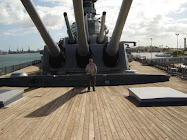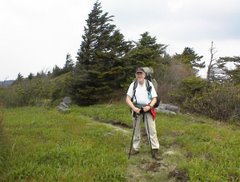Loosed from their bonds
in a thousand southern corn fields
in grim and ragged array
these scarecrows looked dangerous.
The next morning we were up before dawn and started a fire to cook a bit of breakfast. Whit said he felt bad, like he was getting sick, so I cooked his breakfast for him and made sure he had plenty to eat. Whit’s a strange one and has his peculiar ways, but you look after your friends. Whit seemed to feel a bit better after breakfast as we marched off toward Petersburg, shouldering our rifles and our bedrolls. They said we all needed to be alert because we were approaching the battlefield. I didn’t relish the thought of shooting at the Yankees, or being shot at, but I confess I was finally getting used to the thought.
The next day we left camp at 5:30 in the morning and arrived in Petersburg about eight o’clock that night. We had walked almost seventy-five miles through the Virginia countryside in three days and were very much sore of foot. Whit and I were directed to the 18th North Carolina Regiment, of General Lane’s Brigade in General Wilcox’s Division in General A.P. Hill’s III Corps, Army of Northern Virginia. We were told it was important to remember all that. Seems now I can’t forget it.
When we got to the camp behind the entrenchments, our jaws dropped at what we saw. I don’t know what I expected, but it wasn’t what I saw. The men of the regiment, sitting around the “bombproofs” and in the trenches were the skinniest, dirtiest men I ever saw in my life. Many were the color of the dirt of the trenches. Some sat back in holes dug into the trench walls to protect themselves from the shells that fell from time to time. Some lounged around the huts. Others stood posts along the earth works, which wound on and on, as far as the eye could see, north and south. Their clothes were mostly rags, some had no shoes. They peered at us through haunted eyes, their cheeks hollow with a hunger that seemed to go to the bone. They indeed looked like scarecrows that someone had pulled out of every field in the south and put here in Petersburg as though an army of crows had to be kept away from a sea of corn. Whit leaned toward me, his eyes wide, and whispered, “Is this the Confederate Army?”
“I guess it is, and if this is what being a Confederate means, I expect that you and me are in for some hard times, old friend.”
The fellows watched us as we came in, Whit and me and two other men, Lester Carpenter and Walter Gross, who were also assigned to the 18th. The veterans seemed to think we looked funny and there was a lot of jest about the new crop of dirt farmers come to be soldiers. Some sneered at the conscripted and coerced newcomers. There was plenty of good natured laughter and joking about us. As we walked by, a few called out, “Hey mister, here’s your mule!” I learned later it was a sort of joke based on an old farmer who lost a mule in a Confederate camp. One or two yelled out, “Keep yer head down, Billy’s got ye in his sights.” You could tell some of them had seen some hard fighting and hard living and needed to jest to keep their spirits up.
We got directions to Regimental headquarters and there we reported in and were sent to Sergeant Caswell Hutchins. The sergeant was from Rutherford County. I knew his family. They lived only a few miles from me. He was tall and angular, a huge man, maybe six four or five, with broad powerful shoulders. His hair was dark and he wore a full, thick mustache that mostly covered his mouth. The men called him Sergeant Cas and he didn’t seem to mind. He got us situated in a hut and told us about the duty routine. It was mostly spending time on watch and every third day on picket duty. Sometimes we drilled. The colonel liked to keep his men active. The army was just waiting for the Yankees to attack. By this time in the war, General Lee was not able to maneuver his army because the Yankees had come in such numbers that he was forced back into these entrenchments around Petersburg for the defense of Richmond, the capital of this here Confederacy. There really wasn’t much he could do when he was outnumbered by three or four to one, short of supplies and very much out-gunned. Some called him the Gray Fox. Now the fox was cornered and the hounds knew it.
The Southern politicians had counted on the North to give up the war, since so many Yankees had been killed or wounded; some said maybe three hundred thousand. The war was hard on the Yankees, but harder on the South. The Yankees had all the manufactories and shipyards and three or four times as many people and Mr. Abraham Lincoln just would not give up. You had to admire him for that, whether you liked him, or agreed with him or not. Old Abe had the bit in his teeth, and he was holdin’ on like grim death.
The Yankee papers said he wanted to preserve the Union. I never could argue with that idea. This is a great country, even if we were having a family quarrel. Our problem was the Yankees kept sending troops and guns, including huge artillery pieces and powerful mortars, a mile or so away, like nothing the Confederate Army ever had, guns that would throw 120 pound shells right into the Confederate entrenchments and into the city beyond. They never seemed to run out of ammunition. The more about this I learned, the more amazed I was that the Yankees hadn’t already won the war. Then they told me about the character of General Lee and how he refused to give up. The men vowed that they would fight for him until hell froze over and then fight on the ice.
In the course of our evening discussions in our hut, I learned that General Lee was the son of a great revolutionary war hero named General “Lighthorse” Harry Lee who was a trusted officer of General George Washington. General Lee had graduated at the top of his class at West Point and had finished with no demerits. He was a hero in the Mexican War and after South Carolina seceded, he was offered the position of Commander in Chief of the entire United States Army. Instead, he chose to fight with Virginia, since that was his home and his country and he could not raise his arm against it. He loved the United States of America and had served it honorably and well, but to fight against his family and his home, he could not do.
He and the renowned generals Stonewall Jackson, Jeb Stuart, James Longstreet, A.P. Hill and others had won many victories over the Yankees. The Federals had replaced their top general of the Army of the Potomac, which was the main Union army Lee faced, five or six times. Seemed they couldn’t best General Lee, even with more troops, better equipment and heavier artillery. The new general, Grant, had learned how to use his huge army to force the Confederates to maneuver backward toward Richmond. Lee had to move the army in order to cut off Grant’s intended line of march. Grant had forced General Lee to entrench around Petersburg, to protect the vital supply lines to Richmond. And that was where it stood when Whit and I arrived in Petersburg, that sunny September day.
Camp routine was monotonous. The food was pitiful; we got about a pint of meal and two spoons of sugar every day. We made sloosh, a kind of soppy cornpone. Sometimes there was meat, usually spoiled bacon, and once in a while we got some cornfield peas or dried beans. And there was always hardtack.
There was a lot of sickness in the camps, typhus, measles, dysentery and every other ailment known to mankind it seemed. We all dreaded getting sick, but the thing I learned to hate worse than anything was the lice. I had always taken pride in keeping myself clean as possible. I bathed more often than most and my dear wife kept the few clothes I had as clean as any farmer in the county. When Whit and I settled into our hut, the lice found us. It made me feel dirtier and lower than a snake’s belly. I hated the feeling of some little critter living on my skin. Whenever I could get lye soap, I scrubbed myself the very best I could. It was most distressing for anyone who was not used to living in filth. Lice were the scourge of the Army, though they were only one among many. It was a hard life in Petersburg.
There were over thirty miles of entrenchments manned by no more than 50,000 troops. The Yankees, it was said, had 100,000 around Petersburg alone. It was a wonder that they had not already overrun us. They had a huge supply port and depot on the James River at a place called City Point, just east of Petersburg. They brought in all the supplies an army could ever need, guns, ammunition, food, clothing and other equipage. They had a hospital there. They even had a bakery which produced fresh bread every day for the troops. We would have walked five miles on our knees to get a loaf of fresh bread.
The Yankees had all the advantages, except that they were on our soil. Still, I don’t know how General Lee held on. Some said Grant was just waiting to starve us out. From where I stood, it looked a lot like that just might happen.
We spent a lot of time watching the Yankees across the entrenchments. You had to keep your head down because there were sharpshooters, which we had as well, but mostly they left us alone, except for the shelling. Sometimes it came in volleys, sometimes just a single massive shell. You could hear them coming, screeching through the air. Sometimes we heard the boom of the big guns that fired them. Out of the blue they came, ripping the air, hurtling in an arc over our entrenchments and into our camps and the city, the rifled shells shrieking like hysterical birds.
Death came quick if an artillery shell found you. The uncertainty day to day wore on the nerves. Starvation and the ever present possibility of walking out of your hut and being blown to a thousand pieces kept your mind agitated and your body in distress. I often thought I would rather we just leave the entrenchments, march toward Grant’s boys and have at it. Win or lose, at least we would be doing something, not waiting to starve, or die of the typhus, or be blown apart by a random shell.
I have to say life in Petersburg was not all grimness, though. Sometimes things happened that were so funny or so strange; they made you forget that death lurked just around the corner. One day in late September, a bunch of us were watching a new detachment of Yankee troops set up camp no more than a mile away from our outermost fort. They had brand new uniforms and were all spit and polish. Theophilus Pate had some binoculars and was watching them, when he busted out laughing, threw his head back and almost fell over backwards. It turns out he could see their latrine sinks from our position and he said, “Look at what they’re wiping theirselves with!”
We took turns peeping through the binoculars and we could see that there was a big patch of poison ivy near the Yankees’ new latrine. The men would grab up a handful of leaves as they went to the sinks. I reckon these Yankees were mostly city boys or maybe new immigrants, had never seen poison ivy and they were using the leaves! Maybe they had run out of paper. If so, it must have been the only thing.
We all had a good laugh over that little episode. In fact we laughed so hard, men gathered around from the regiments on each side of us to learn what was going on. When they found out, half the Division was rolling around laughing. I’m sure the Yankees wondered what the Rebs were laughing so hard about. Quite a few of them found out within a day or so. In fact, for quite a few days after that, there were a lot of Yankee soldiers scratching themselves furiously about their private parts. Some of our pickets would call over to them and say “Hey Yank, scratch where it itches!” or “How do you like that Rebel paper?” We felt pretty safe from attack from that bunch since we knew they couldn’t scratch with one hand and fire with the other!
Tuesday, September 8, 2009
Subscribe to:
Posts (Atom)







